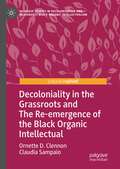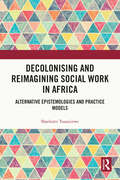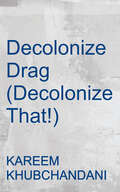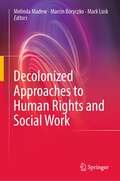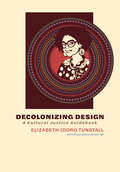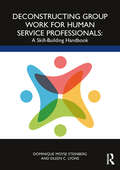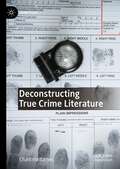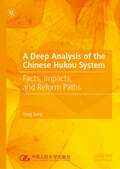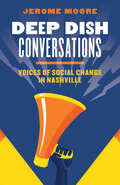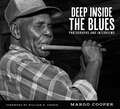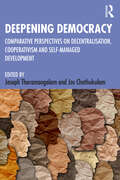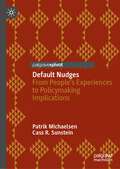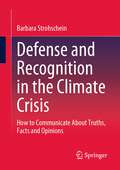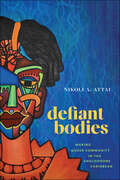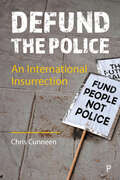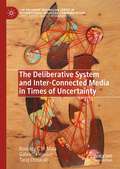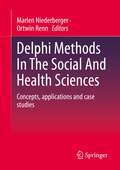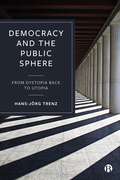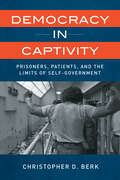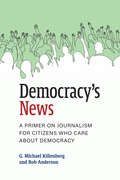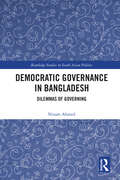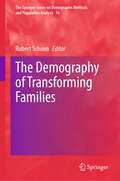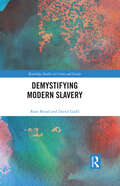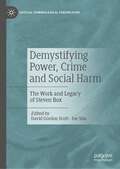- Table View
- List View
Decoloniality in the Grassroots and The Re-emergence of the Black Organic Intellectual (Palgrave Studies in Decolonisation and Grassroots Black Organic Intellectualism)
by Ornette D. Clennon Claudia SampaioThis book explores the relationship between "the roles of the Black “organic intellectual” and the PoC academic scholar, and outlines how important partnerships are emerging from these sometimes-contrasting decolonial praxes. By blending the decolonial processes of Indigenous rights via a liberation Psychology lens, Brazilian critical race scholarship and UK African diasporic collective consciousness via intersectional critical race studies, the authors provide a clear theoretical framework to show how a decolonised multi-layered community epistemology can be produced by the community for the community that in praxis form, can be employed for the fight for social justice within those communities.
Decolonising and Reimagining Social Work in Africa: Alternative Epistemologies and Practice Models
by Sharlotte TusasiirweThis book explores contemporary debates on decolonisation and indigenisation of social work in Africa and provides readers with alternative models, values, and epistemologies for reimagining social work practice and education that can be applicable to a wide range of countries struggling with similar concerns. It examines how indigenisation without decolonisation is just tokenistic since it is concerned with adapting, modifying Western models to fit local contexts or generating local models to integrate into the already predominantly contextually irrelevant and culturally inappropriate mainstream Western social work in Africa.By exploring decolonisation, which calls for dismantling colonialism and colonial thinking to create central space for indigenous social work as mainstream social work, especially in Africa, it goes beyond tokenistic decolonisation to articulate some of the indigenous social work practice and social policy models, values, ethics, and oral epistemologies that should take centre stage as locally relevant and culturally appropriate social work in Africa. It also addresses the question of decolonising research methodologies, highlighting some of the methods embedded in African indigenous perspectives for adoption when researching African social work. The book has been written with both the coloniser/colonised in mind and it will be of interest to all social work academics, students and practitioners, and others interested in gaining insights into how colonisation persists in social work and why it is necessary to find ways to disrupt it.
Decolonize Drag (Decolonize That! Ser.)
by Kareem Khubchandani Bhakti ShringarpureAlthough imagined as a queer subcultural practice, drag seems to be everywhere we look: from AI filters on TikTok to brunchtime entertainment, from state legislations to political rallies. Yet as drag enters the mainstream—largely due to the intense, global popularity of reality TV competition RuPaul’s Drag Race—some kinds of gender-based performance fall out of the purview of what we (could) call drag. Decolonize Drag details the ways that gender is used as a form of colonial governance to eliminate various types of expression, and tracks how contemporary drag, including that on Drag Race, both replicates and disrupts these institutional hierarchies. This book focuses on several gender performers that resist and laugh at colonial projects through their aesthetic practices. It also features the voice of Khubchandani's drag alter ego, judgmental South Asian aunty LaWhore Vagistan. From the firsthand perspective of a drag artist, LaWhore describes encounters with depoliticized versions of drag that leave her disappointed and perplexed, and prompts Khubchandani for context and analysis. Their dynamic sets the tone for the book, investigating how drag—and gender more broadly—has been privatized and delimited so that it's only available to certain people. Decolonize Drag argues for more abundance in and access to fashioning gender, and considers how drag changes meaning and efficacy as it shifts across geographies.
Decolonized Approaches to Human Rights and Social Work
by Mark Lusk Melinda Madew Marcin BoryczkoDespite committed effort to integrate postcolonial theory and decolonizing practices in human rights education in social work, there is scant literature offering a more balanced global perspective. This book addresses that need. Included here are discursive voices contributed by social work colleagues whose work is impacted by postcolonial realities. The task of decolonizing social work as a human rights profession calls for the inclusion of contesting perspectives from social work activists, human rights advocates and educators whose critical standpoints are drawn from the historical context of Global North-South relations. This book is essential given the many manifestations of global injustice, wars and climate catastrophes. The critical involvement of social workers in decolonized human rights advocacy is at no period in history, more urgent than now. The book: Engages readers in reflective discourse over the contentious manner human rights principles are referenced by social work practitioners within the context of contemporary North-South geopolitics Explores dilemmas, conflicts, challenges and limitations experienced by social workers worldwide while upholding human rights principles Uses critical case studies that expose how the vestiges of colonialism continue to impact communities Identifies areas of human rights advocacy where social work succeeds, and where it is confronted by limiting challenges Emphasizes the importance of human rights education and practice in the context of global inequalities Decolonized Approaches to Human Rights and Social Work provides models of good practice the world over in human rights advocacy. It is timely and essential reading for faculty who teach courses in social work, social development, community organization, human rights and social justice, as well as for students in social work, law, sociology, global studies and human rights. The book should draw readers who work in non-governmental organizations, international development agencies, advocacy groups, and community-based and grassroots organizations. International research centers, law clinics and organizations serving migrants and refugees would find it a useful resource.
Decolonizing Design: A Cultural Justice Guidebook
by Elizabeth (Dori) TunstallA guidebook to the institutional transformation of design theory and practice by restoring the long-excluded cultures of Indigenous, Black, and People of Color communities.From the excesses of world expositions to myths of better living through technology, modernist design, in its European-based guises, has excluded and oppressed the very people whose lands and lives it reshaped. Decolonizing Design first asks how modernist design has encompassed and advanced the harmful project of colonization—then shows how design might address these harms by recentering its theory and practice in global Indigenous cultures and histories.A leading figure in the movement to decolonize design, Dori Tunstall uses hard-hitting real-life examples and case studies drawn from over fifteen years of working to transform institutions to better reflect the lived experiences of Indigenous, Black, and People of Color communities. Her book is at once enlightening, inspiring, and practical, interweaving her lived experiences with extensive research to show what decolonizing design means, how it heals, and how to practice it in our institutions today.For leaders and practitioners in design institutions and communities, Tunstall&’s work demonstrates how we can transform the way we imagine and remake the world, replacing pain and repression with equity, inclusion, and diversity—in short, she shows us how to realize the infinite possibilities that decolonized design represents.
Deconstructing Group Work for Human Service Professionals: A Skill-Building Handbook
by Dominique Moyse Steinberg Eileen C. LyonsSpotlighting the skills of social group work, this handbook offers practical guidance and theoretical knowledge, enabling the reader to facilitate groups of varying types with increased clarity, purpose, and confidence. The reader is helped to understand what skill to employ, when, and why. New or veteran group facilitators are reminded to empower group members to both employ their strengths and engage in mutual aid – the fundamental value and methodology that underlies social group work. Specific skills help group members to coalesce as a cohesive group and optimize their capacity to reach their goals whether exploring therapeutic answers or accomplishing work tasks. This book illustrates that there are “basics” to the method of human service work with groups that can help you to feel more at ease with and more effective at working with people in groups. The group work method is delineated for you, outlining: (1) skills of working with groups (ways of thinking or doing to make things happen), (2) practice principles (the moral reasoning that underlies what you choose to think and do in your practice), and (3) theoretical underpinnings for those choices (why your choices will achieve desirable ends). Anecdotal material and skills in action provide explicit examples of what skills look like in real time. Social work students and academics as well as students and professionals working in the fields of youth work, counseling, mental health/clinical social work, and related health subjects will find this book of interest.
Deconstructing True Crime Literature (Crime Files)
by Charlotte BarnesThis book provides a critical discussion of True Crime literature, arguing for the deconstruction of the genre into subgenres that better reflect a work’s contents. In analysing seminal and lesser-known works, the areas of authenticity, accuracy, and author proximity are considered to form a framework on which an individual publication’s subgenre (re)categorisation can be assessed. The book considers the likes of Ann Rule, Truman Capote, and Maggie Nelson, among other notable authors. Their works – those that fit into True Crime and those that defy categorisation within the genre as it exists – are reviewed, and their defining features critiqued. Topics such as narrative methodologies, figurative language, and utilisation of research are considered in support of this. These strands combine to a larger discussion regarding a deconstruction of True Crime, and the ways in which this will improve the social responsibility of the genre, and encourage a more conscientious consumerism of it.
A Deep Analysis of the Chinese Hukou System: Facts, Impacts, and Reform Paths
by Yang SongThis book explores China's hukou system, by which individuals are registered in a specific geographic region, and the prospects for reform. The history of the hukou system and its instrumental role in Chinese urbanization and labor markets is explained, and readers get a sense of what issues are prioritized by Chinese policymakers as they contemplate reform or change to this system, from hukou-based labor market discrimination, inequality of opportunity, multi-dimensional poverty of rural migrants, the public health consequences of non-hukou migration, and old age insurance for migrants without hukous. The author concludes with a stirring and practical call for hukou reform, articulating a cost-benefit model and providing an array of policy suggestions. This book will interest scholars of Chinese society, demographics and future urbanization.
Deep Dish Conversations: Voices of Social Change in Nashville
by Jerome MooreWhat does it mean to be a Nashvillian? A Black Nashvillian? A white Nashvillian? What does it mean to be an organizer, an ally, an elected official, an agent for change? Deep Dish Conversations began as a running online interview series in which host Jerome Moore sits down over pizza with Nashville leaders and community members to talk about the past, present, and future of the city and what it means to live here. The result is honest conversation about racism, housing, policing, poverty, and more in a safe, brave, person-to-person environment that allows for disagreement. This book is a curated collection of the most striking interviews from the first few seasons of the series, with a foreword by Dr. Sekou Franklin, an introduction by Moore, and contextual introductions to each interviewee. Figures like Judge Sheila Calloway, comedian Josh Black, anti-racism speaker Tim Wise, organizer Jorge Salles Diaz, and many more explore their wide-ranging perspectives on social change in a city in the midst of massive demographic and ideological shifts. For anyone in any twenty-first-century city, Deep Dish Conversations offers a lot to think about—and a lot of ways to think about it.
Deep Inside the Blues: Photographs and Interviews (American Made Music Series)
by Margo CooperDeep Inside the Blues collects thirty-four of Margo Cooper’s interviews with blues artists and is illustrated with over 160 of her photographs, many published here for the first time. For thirty years, Cooper has been documenting the lives of blues musicians, their families and homes, neighborhoods, festivals, and gigs. Her photographic work combines iconic late-career images of many legendary figures including Bo Diddley, Honeyboy Edwards, B. B. King, Pinetop Perkins, and Hubert Sumlin with youthful shots of Cedric Burnside, Shemekia Copeland, and Sharde Thomas, themselves now in their thirties and forties. During this time, the Burnside and Turner families and other Mississippi artists such as T-Model Ford, James “Super Chikan” Johnson, and L. C. Ulmer entered the national and international spotlight, ensuring the powerful connection between authentic Delta, Hill Country, and Piney Woods blues musicians and their audience continues. In 1993, Cooper began photographing in the clubs around New England, then in Chicago, and before long in Mississippi and Helena, Arkansas. On her very first trips to Mississippi in 1997 and 1998, Cooper had the good fortune to photograph Sam Carr, Frank Frost, Bobby Rush, and Otha Turner, among others. “The blues come out of the field,” Ulmer told Cooper. Seeing those fields, as well as the old juke joints, country churches, and people’s homes, inspired her. She began recording interviews with the musicians, sometimes over a period of years, listening and asking questions as their narratives unfolded. Many of the key blues players of the period have already passed, making their stories and Cooper’s photographs of them all the more poignant and valuable.
Deepening Democracy: Comparative Perspectives on Decentralization, Cooperativism and Self-Managed Development
by Joseph Tharamangalam and Jos ChathukulamThis book examines the renewed interest and commitment that countries across the world have shown in recent decades towards adopting models of decentralising, or "downsizing" the state, and moving towards more participatory models of government. It examines systems of decentralised development such as self-managing co-operatives from a global and comparative perspective with a focus on developing countries. Drawing on examples from Kerala and a few other states in India, as well as Cuba, Bangladesh and South Africa among other countries, the book offers critical perspectives on the positive impacts of these experiments and the promises these offer for the future. It discusses the challenges of implementing these models, how well these work in coordination with the civil society and the state, issues of transparency and democratic oversight as well as corruption and capture of power due to entrenched structures of inequality. The volume analyses welfare and development models and self-management interventionsin countering the effects of the COVID-19 pandemic. It also looks at the meritsand demerits of decentralisation in countering the global socioeconomic and environmental crisis and the rise of authoritarian populism in many countries. The book will be of interest to students and researchers of development studies, political science, business, community development, social justice as well as of co-operative management programmes. It will also appeal to students of political economy as well as development professionals, think tanks and policymakers.
Default Nudges: From People's Experiences to Policymaking Implications
by Patrik Michaelsen Cass R. SunsteinAll over the world, private and public institutions have been attracted to “nudges,” understood as interventions that preserve freedom of choice, but that steer people in particular directions. The most effective nudges are often “defaults,” which establish what happens if people do nothing. For example, automatic enrollment in savings plans is a default nudge, as is automatic enrollment in green energy. Default rules are in widespread use, but we have very little information about how people experience them, whether they see themselves as manipulated by them, and whether they approve of them in practice. In this book, Patrik Michaelsen and Cass R. Sunstein offer a wealth of new evidence about people’s experiences and perceptions with respect to default rules. They argue that this evidence can help us to answer important questions about the effectiveness and ethics of nudging. The evidence offers a generally positive picture of how default nudges are perceived and experienced. The central conclusion is simple: empirical findings strongly support the conclusion that, taken as such, default nudges are both ethical and effective. These findings, and the accompanying discussion, have significant implications for policymakers in many nations, and also for the private sector.
Defending French in Flanders, 1873–1974: Between Liberty and Identity
by David J. HensleyThis book examines the efforts of the French-speaking minority in Flanders, Belgium, to maintain a legal and social presence of the French language in Flemish public life. Chronologically, the study is bookended by two developments, almost exactly a century apart. In 1873, the first laws were passed which required the use of Dutch in some aspects of public administration in Flanders, challenging the de facto use of French among the Flemish ruling class. One hundred and one years later, the last French daily newspaper in Flanders collapsed, marking the end of a once-vibrant French-language public sphere in Flanders. The author contends that the methods and arguments by which French speakers defended the role of French in Flemish public life changed along with the social and political situation of this minority. As the Flemish movement grew over the course of the twentieth century, French speakers’ appeals to the “free choice” of language lost traction, and they put forward claims that they represented an ethnolinguistic minority who deserved protection for their mother tongue. Providing new insights for scholars of European history, and in conversation with the literature on liberalism, national identity, and Francophonie, this book demonstrates how the debate over the role of French in Flanders was at the center of Belgium’s ethnolinguistic conflict – the repercussions of which continue to be felt to this day.
Defense and Recognition in the Climate Crisis: How to Communicate About Truths, Facts and Opinions
by Barbara StrohscheinTruths, facts and opinions on the climate issue are often met with psychological or social defense, both publicly and privately. Based on selected psychological and philosophical theories as well as data material, this book shows how defense comes about, how it works, and how, on the other hand, the necessary recognition can succeed on various levels. It is only through recognition that constructive discourse becomes possible. This book offers all the basics to be able to theoretically and practically solve communication conflicts between defense and recognition in the climate crisis.
Defiant Bodies: Making Queer Community in the Anglophone Caribbean (Critical Caribbean Studies)
by Nikoli A. AttaiIn the Anglophone Caribbean, international queer human rights activists strategically located within and outside of the region have dominated interventions seeking to address issues affecting people across the region; a trend that is premised on an idea that the Caribbean is extremely homophobic and transphobic, resulting in violence and death for people who defy dominant sexual and gender boundaries. Human rights activists continue to utilize international financial and political resources to influence these interventions and the region’s engagement on issues of homophobia, transphobia, discrimination, and the HIV/AIDS epidemic. This focus, however, elides the deeply complex nature of queerness across different spaces and places, and fails to fully account for the nuances of queer sexual and gender politics and community making across the Caribbean. Defiant Bodies: Making Queer Community in the Anglophone Caribbean problematizes the neocolonial and homoimperial nature of queer human rights activism in in four Anglophone Caribbean nations -- Barbados, Guyana, Jamaica, and Trinidad and Tobago -- and thinks critically about the limits of human rights as a tool for seeking queer liberation. It also offers critical insight into the ways that queer people negotiate, resist, and disrupt homophobia, transphobia, and discrimination by mobilizing “on the ground” and creating transgressive communities within the region.
Defund the Police: An International Insurrection
by Chris CunneenThe police are viewed as guardians of public safety and enforcers of the law. How accurate is this? Given endemic police violence which is often aimed at racialised and minoritised groups and the failure of many attempts at reform, attention has turned to community-generated models of support. These include defunding the police and instead funding alternatives to criminalisation and incarceration. This book is the first comprehensive overview of police divestment, using international examples and case studies to reimagine community safety beyond policing and imprisonment. Showcasing a range of practical examples, this topical book will be relevant for academics, policy makers, activists and all those interested in the Black Lives Matter movement, protest movements and the renewed interest in policing and abolitionism more generally.
The Deliberative System and Inter-Connected Media in Times of Uncertainty (The Palgrave Macmillan Series in International Political Communication)
by Rousiley C. Maia Gabriella Hauber Tariq ChoucairAdopting a systemic perspective, this book explores media-based communication and reason-giving as a linkage process that transcends time and space. Arguments, reasoning perspectives and emotional concerns link elites’ and citizens’ political judgement within and across a set of interrelated arenas in the political system.
Delphi Methods In The Social And Health Sciences: Concepts, applications and case studies
by Marlen Niederberger Ortwin RennDelphi methods enable the systematic collection of expert judgments. They have proven to be particularly useful when a certain level of expertise and judgment is required to answer a research question. There are different variants of Delphi methods, such as the group Delphi or the real-time Delphi. The book presents current methodological developments and examples of application in the social and health sciences.The contents● Delphi methods: Concepts and variants - Epistemological discussion - Practical challenges - Delphi in the social and health sciences - Real-time Delphi - Delphi markets.● Application examples for Delphi methods - Qualification requirements, recommendations for action for further development and strategy development in the health care industry - Personnel retention and recruitment in occupational nursing - Group Delphi for obesity prevention- Safety and health competence at work - Delphi methods in health promotionThe editorsProf. Dr. Marlen Niederberger is professor for research methods in health promotion and prevention at the PH Schwäbisch Gmünd.Prof. Dr. Ortwin Renn is Scientific Director at the Institute for Advanced Sustainability Studies, Potsdam (IASS).This book is a translation of the original German 1st edition Delphi-Verfahren in den Sozial- und Gesundheitswissenschaften by Marlen Niederberger and Ortwin Renn, published by Springer Fachmedien Wiesbaden GmbH, part of Springer Nature in 2019. The translation was done with the help of artificial intelligence (machine translation by the service DeepL.com). A subsequent human revision was done primarily in terms of content, so that the book will read stylistically differently from a conventional translation. Springer Nature works continuously to further the development of tools for the production of books and on the related technologies to support the authors.
Democracy and the Public Sphere: From Dystopia Back to Utopia
by Hans-Jörg TrenzFrom fake news to infringement of privacy in digital spheres, the changing landscapes of media and public communication have completely transformed contemporary democracies in recent decades. Disruptions of media functioning can be seen as evidence for a transition from democracy to post-democracy, but how plausible is this scenario? Using empirical evidence, the author asks how imminent the threat of the end of democracy is, and how it can be restored. Exploring the creative and destructive ways individuals and groups make use of new digital and social media in democratic societies across the world, the book presents a much-needed critical theory of the public sphere as we enter the new digital age.
Democracy in Captivity: Prisoners, Patients, and the Limits of Self-Government
by Christopher D. BerkWho ought to govern those held in custody, and by what right? Democracy in Captivity examines various efforts to answer these questions, centering on two case studies at custodial institutions: the rise and demise of patient self-governance at St. Elizabeths Hospital in Washington, DC, between 1947 and 1965 and the prisoner-organized governance of Massachusetts's Walpole State Prison following a 1973 prison-guard strike. As Christopher D. Berk shows, the promise of these initiatives was tempered by the custodians' backlash to their wards' attempts at self-rule. This backlash arrived not only in the blunt forms of restraint chairs, riot gear, and a surgeon's scalpel but also as more covert measures taken under the cover of so-called democratic management—which in turn entrenched disenfranchisement and naturalized authoritarian rule. Turning from these case studies to a wider consideration of custody and democracy, Berk explores pathologies that have captured the politics of punishment, with pressing implications for the practice of democracy both inside and outside custodial institutions.
Democracy's News: A Primer on Journalism for Citizens Who Care about Democracy
by G. Michael Killenberg Rob AndersonSince the Founding, America’s faith in a democratic republic has depended on citizens who could be trusted to be communicators. Vigorous talk about equality, rights, and collaboration fueled the Revolution, the Declaration of Independence, and the Constitution with its amendments. In a republic, the people set the terms for their lives not individually, but in community. The genius of keeping it alive exists in how everyday citizens talk and listen, write and read, for a common good. Dialogue and deliberation—rather than an accumulation of individual preferences—sustains a republic, yet a diminished and scarred institution of journalism jeopardizes citizens’ access to shared and truthful information. A disturbing “what’s in it for me?” attitude has taken over many citizens, and a creeping, autocratic sense of dismissive accusation too often characterizes the political style of elected officials. The basic fuel for democracy is the willingness of informed citizens to take each other seriously as they talk about political choices. Once we begin to clam up, build walls, and dismiss each other, we unravel the threads tying us to the Founders’ vision of a republic. A free press and free speech become meaningless if not supported by sustained listening to multiple positions. There are those who profit by dividing citizens into two camps: a comfortable “us” versus a scary “them.” They make their case with accusations and often with lies. They warp the very meaning of communication, hoping citizens never truly discover each other’s humanity. Democracy’s News discusses today’s problems of public communication in the context of history, law, and interpersonal life. News should not be something to dread, mistrust, or shun. Aided by reliable, factual journalism, citizens can develop a community-based knowledge to cope with social issues great and small. They come to treat neighbors and strangers as more than stereotypes or opponents. They become collaborators with whom to identify and sustain a working republic where news, citizenship, and public discourse merge.
Democratic Governance in Bangladesh: Dilemmas of Governing (Routledge Studies in South Asian Politics)
by Nizam AhmedThis book explores the role of government in the governing process of Bangladesh. It primarily focuses on the dilemmas and constraints faced by the successive democratic governments elected since the early 1990s. Bangladesh has had a new democratic beginning since the early 1990s and formally remained a democracy for the last the three decades. Despite impressive performance in the economic and social fields, the country has lagged far behind most of the new democracies in the political realm. This book identifies how representative institutions of governance have gradually declined under democratic governments in Bangladesh, and how disagreements on the ‘basic rules of the game’ have made the task of governing extremely difficult and democratic consolidation problematic. This book is a significant and comprehensive analysis that identifies and explains the implications of the crises in governance for democratic consolidation in Bangladesh. It will be of interest to academics studying Area Studies, in particular South Asian Studies, and the increasingly researched areas of governance, public policy, and administration.
The Demography of Transforming Families (The Springer Series on Demographic Methods and Population Analysis #56)
by Robert SchoenThis book provides an up-to-date survey on the nature, causes, and patterns of family change. The traditional nuclear family has been replaced by a multiplicity of other forms, as widespread cohabitation, high levels of divorce and union dissolution, rising childlessness, and far below replacement fertility have emerged to an extent never before seen. Theoretical perspectives on this “Second Demographic Transition” are presented, highlighting the dramatic changes in gender roles. New methodological strategies for assessing family dynamics are presented, from multistate models of marriage and divorce combined with fertility to improved techniques for combining census and survey data on the family to a new approach for disentangling age, period, and cohort effects. While the volume emphasizes Western nations, insightful case studies range from analyzing family complexity in cohorts of parents and children in the UK to the impact of interpartner violence on family formation, to the emergence of a “gender war” in South Korea. By providing new insights into where we are today and how we got here, the book will be of value to all those interested in the contemporary family."Delayed Fertility as a Driver of Fertility Decline?" available open access under a Creative Commons Attribution 4.0 International License via link.springer.com.
Demystifying Modern Slavery (Routledge Studies in Crime and Society)
by Rose Broad David GaddWho are the perpetrators of modern slavery? Why do they exploit others? What might be done to stop exploitation recurring? These are the questions answered in this book. Reporting on the first primary study of modern slavery offenders, the book depicts the findings of in-depth interviews with people accused of, and convicted for, committing modern slavery offences. The different forms that modern slavery takes are explained chapter by chapter: organised crime, people smuggling, labour exploitation, domestic servitude, sham marriage, the trafficking of adults for sexual exploitation and child sex trafficking. Using case studies to illuminate the perspectives of those deemed perpetrators, we show that few modern slavery offenders conform to stereotypes of people traffickers. Through an interpretive analysis of offenders’ life-stories, we reveal the points in the past and present where interventions could have prevented victims from becoming trapped in exploitation. We show that while national governments and international bodies often appear resolute in their efforts to tackle modern slavery and people trafficking, they have also obscured their own roles in compounding the plights of those at the sharp ends of globalization. In racializing the actions of sex traffickers, grooming gangs, and organised criminals, the modern slavery agenda has mystified the roles market dynamics, the absence of workers’ rights, and immigration controls play in generating vulnerabilities to exploitation. This book will be of interest to a wide range of students, policymakers and practitioners concerned with modern slavery, human trafficking, border control and immigration, globalization and inequality, as well as the more discipline-focused criminological audiences concerned with why people commit crimes, what should be done about them and the, often paradoxical, consequences of social control across borders. Given the book’s strong focus on narrative, psychosocial and social network methodologies it will also appeal to audiences across the social sciences concerned with applying these novel approaches to difficult to reach populations.
Demystifying Power, Crime and Social Harm: The Work and Legacy of Steven Box (Critical Criminological Perspectives)
by David Gordon Scott Joe SimThis collection revisits Steven Box’s book, Power, Crime and Mystification, published in 1983, and considers its relevance forty years on. It introduces the critical analysis developed by Box which examined corporate crime, police crime, rape and sexual assault and female crime and analyses the continuities and discontinuities since 1983 in relation to crime, the state and the exercise/mystification of power. The book explores the ways in which we can see his influence nationally and internationally on critical criminological, zemiological and abolitionist writings today. It asks how can these perspectives be applied to a critical analysis of contemporary, state authoritarianism and the criminal injustice that this authoritarianism generates? Additionally, how can Box’s concepts shine a critical light on contemporary social harms that were not covered in the original book? The collection provides a toolkit for students and academics to critically analyse the issues around crime/social harm, power/powerlessness, truth/mystification, criminal injustice/social justice as well as historical and contemporary sites of resistance confronting the exercise of state power.
